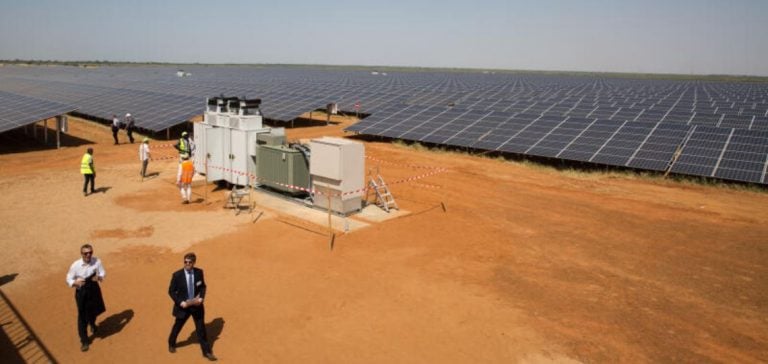The Just Energy Transition Partnership (JETP) is an international financing program designed to accelerate the energy transition in developing countries. It aims to reduce carbon emissions and promote the adoption of renewable energies.
Supported primarily by the G7 countries, as well as other donors, JETP aims to assist countries heavily dependent on coal in their decarbonization process.
Beneficiary countries, such as South Africa, Indonesia, Vietnam and Senegal, face major challenges in meeting their climate commitments, despite promised funding.
South Africa: a pioneer faces power cuts
South Africa was the first country to sign a JETP agreement in 2021, benefiting from $8.5 billion in funding.
The main objective is to limit annual CO2 emissions to between 350 and 375 million tonnes by 2030.
This cap, enshrined in the Paris Agreement, is crucial to reducing dependence on fossil fuels, particularly coal, which accounts for over 80% of the country’s energy mix.
However, the achievement of these targets is jeopardized by a persistent electricity crisis.
Recurrent power cuts are forcing the authorities to review their priorities.
In July 2024, a South African minister declared that resolving power cuts is now the priority, delaying the original timetable for decommissioning coal-fired power plants.
The majority of JETP funding is earmarked for clean electricity projects, but the country is struggling to reconcile its immediate energy needs with its long-term climate commitments.
Indonesia: ambitions limited by slow financial release
With a financing commitment of $20 billion in 2022, Indonesia is the largest beneficiary of JETP.
The plan aims to reduce CO2 emissions from 300 million tonnes to 250 million tonnes by 2030 for the grid-connected energy sector, while increasing the share of renewables in the energy mix from 12% in 2022 to 44% by 2030.
However, disbursements remained limited to $144.6 million by mid-2024, mostly in the form of grants and technical assistance.
Private funding, which is intended to complement the public funding provided by G7 donors, has yet to be fully mobilized.
One notable project supported by the United States has allocated $126 million to geothermal energy, a key resource for Indonesia.
Nevertheless, the country’s dependence on coal, which still provides over 60% of the country’s electricity, makes the gradual phase-out of this fossil fuel a complex undertaking.
Vietnam: earlier climate targets
In December 2022, Vietnam signed a JETP agreement with funding of $15.5 billion.
The country aims to cap greenhouse gas emissions from its power sector at 170 million tonnes by 2030, five years ahead of schedule.
In the longer term, it aims to reduce these emissions to 101 million tonnes by 2050, an ambitious target given the country’s rapid economic growth.
To achieve this, Vietnam is limiting the expansion of its installed coal-fired power plant capacity to 30.13 gigawatts by 2030, from 25.3 GW in 2022.
The country has identified over 220 renewable energy investment projects and is working with 60 groups to mobilize the necessary funds.
Investment is focused primarily on solar and wind power, given the country’s strong potential in both sectors.
Senegal: on the road to cleaner energy
In June 2023, Senegal became the fourth country to sign a JETP agreement, benefiting from a 2.5 billion euro financing pledge led by European Union countries.
The aim is to increase the share of renewable energies to 40% of the country’s energy mix by 2030, up from 29% in 2022.
Unlike other JETP beneficiary countries, Senegal is focusing less on an immediate exit from coal, and more on accelerating the adoption of renewable energies, particularly solar power.
Senegal and its international partners must publish a detailed investment plan by the end of 2024.
Although the development of the country’s energy transition is slower, its smaller size and growing energy sector offer promising prospects for a rapid transition.
JETP challenges and prospects
Although JETP is a laudable initiative, there are a number of obstacles to its effective implementation.
Firstly, delays in mobilizing funds, as observed in Indonesia and Vietnam, slow the progress of renewable energy projects.
In addition, the historical dependence of many countries on coal complicates their transition to a low-carbon energy mix.
Technological capacity is also a major challenge, as existing electricity infrastructures are not always adapted to the intermittent nature of renewable energies.
At the same time, developing countries need to ensure that the energy transition does not compromise their energy security, particularly as they face growing demand for electricity.
JETP countries such as South Africa, Indonesia, Vietnam and Senegal are showing signs of progress, but they will need to meet these challenges with continued support from international donors and increased mobilization of private finance to achieve their climate goals on time.






















